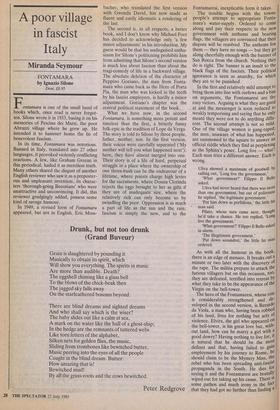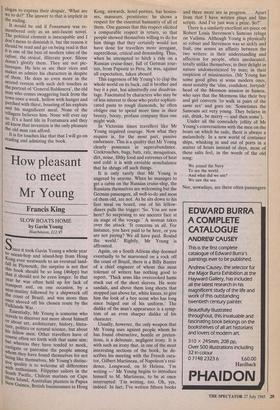A poor village in fascist Italy
Miranda Seymour
FONTAMARA by Ignazio Silone Dent, £8.95 Fontamara is one of the small band of books which, once read is never forgot- ten. Silone wrote it in 1933, basing it on his memories of Pescina dei Marsi, the poor Abruzzi village where he grew up. He intended it to hammer home the lie of benevolent fascism.
In its time, Fontamara was notorious. Banned in Italy, translated into 27 other languages, it provoked violently conflicting reactions. A few, like Graham Greene in this periodical, hailed it as merciless truth. Many others shared the disgust of another English reviewer who saw it as a preposter- ous and unpleasant invention, its charac- ters 'thorough-going Boeotians' who were unattractive and unconvincing. It did, this reviewer grudgingly added, possess some kind of savage humour.
In 1949, a revised form of Fontamara appeared, but not in English. Eric Moss- bacher, who translated the first version with Gwenda David, has now made as fluent and easily idiomatic a rendering of the last.
The second is, in all respects, a better book, and I don't know why Michael Foot has decided to acknowledge only 'a few minor adjustments' in his introduction. My guess would be that his undisguised enthu- siasm for Silone's politicising prohibits him from admitting that Silone's second version is much less about fascism than about the tragi-comedy of life in a backward village. The absolute deletion of the character of Peppino Goriano, the man from Fonta- mara who came back as the Hero of Porta Pia, the man who was kicked in the teeth by his fascist employers, is hardly a minor adjustment. Goriano's chapter was the central political statement of the book.
What we have now, in the second Fontamara, is something more potent and timeless than the first, a bitterly funny folk-epic in the tradition of Lope da Verga. The story is told to Silone by three people, father, mother, son. In the first version, their voices were carefully separated ('My mother will tell you what happened next'); here, they have almost merged into one. Their story is of a life of hard, perpetual struggle in a place where the ownership of one thorn-bush can be the endeavour of a lifetime, where priests charge high levies for the sacraments, where Donna Clorinda rejects the eggs brought to her as gifts if they are of inadequate size, where the relatively rich can only become so by swindling the poor. Oppression is as much a part of life as the sun and the rain; fascism is simply the new, and to the Fontamaresi, inexplicable form it takes.
The trouble begins with the towns- people's attempt to appropriate Fonta- mara's water-supply. Ordered to come along and pay their respects to the new government with anthems and bearing flags, the villagers are convinced that their dispute will be resolved. The anthems fox them — they have no songs — but they go along cheerfully enough with the banner of San Rocca from the church. Nothing they do is right. The banner is an insult to the black flags of the fascists. Their political ignorance is seen as anarchy, for which they are to be punished. In the first and relatively mild attempt to bring them into line with curfews and a ban on arguments, the Fontamaresi are the easy victors. Arguing is what they are good at and the messenger is soon reduced to weakly temporising and saying that he only meant they were not to do anything diffe- rent. The second attempt is not so mild. One of the village women is gang-raped; the men, unaware of what has happened, are summoned to the square to answer an official riddle which they find as perplexing„ as the Sphinx's poser. Long live what! Each man tries a different answer. Each is wrong.
Uliva showed a maximum of goodwill by calling out, 'Long live the govemment.'
'What government?' Filippo Ii Bella asked.
Uliva had never heard that there was more than one government, but out of politeness he replied, 'the legitimate government.'
Put him down as perfidious,' the little fat man said.
Pilato, whose turn came next, thought he'd take a chance. He too replied, 'Long live the government.' 'What government?' Filippo E Bello asked in alarm.
'The illegitimate government.'
Put down scoundrel,' the little fat mall ordered.
As with all the humour in the book, there is an edge of menace. It breaks out a minute or two later with the discovery of the rape. The militia prepare to attack the furious villagers but on this occasion, too, they are defeated, terrified into retreat hY what they take to be the appearance of the Virgin on the bell-tower. The hero of the Fontamaresi, whose role is considerably strengthened and de- veloped in the second version, is Berard da Viola, a man who, having been robbed of his land, lives for nothing but acts of violence. Elvira, the girl who appeared on the bell-tower, is his great love but, with- out land, how can he marry a girl with a good dowry? Having nothing to live for, it is natural that he should be the most defiant and that, having failed to gain employment by his journey to Rome, he should claim to be the Mystery Man, the rebel who has been spreading anti-fascist propaganda in the South. He dies for saying it and the Fontamaresi are brutallY wiped out for taking up his cause. There is some pathos and much irony in the fact that they had got no further than finding a
Slogan to express their despair, 'What are we to do?' The answer to that is implicit in the ending. It would be sad if Fontamara was re- membered only as an anti-fascist novel. The political element is inescapable and I don't mean to diminish it, but the reason it Should be read and go on being read is that it is one of the best of modern tales of the cafoni, the stoical, illiterate poor. Silone doesn't glorify them. They are not pic- turesque. He lets us see their vices and 'flakes us admire his characters in despite of them. He does so even more in the second version with such deft touches as the portrait of 'General Baldissera', the old man who comes swaggering back from the town once a week, hollow with hunger and parched with thirst, boasting of his exploits arid his magnificent meal. None of the Villagers believes him. None will ever say SO. It's a hard life in Fontamara and they all know that invention is the only pleasure the old man can afford.
It is for touches like that that I will go on reading and admiring the book.















































 Previous page
Previous page